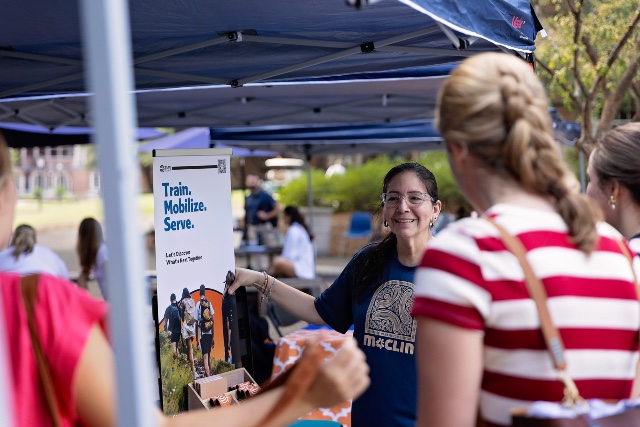
Samford University’s Beeson Divinity School hosted its annual Go Global Week from Oct. 6-9, as speakers and mission agencies came to campus to help both undergraduate students and Beeson students consider their place in God’s work of bringing the Gospel to all nations.
Brian Fikkert, founder of the Chalmers Center for Economic Development and professor of Economics and Community Development at Covenant College in Chattanooga, Tennessee, served as the week’s lecturer.
Preaching in chapel, Fikkert asked the audience to consider what missions looks like in light of the global issue of poverty. Fikkert, who has written multiple books discussing how to approach poverty in missions without harming the poor and the missionary, said the way we answer question, “Why did Jesus come to Earth?” will “shape everything that we do as God’s people.”
Preaching from Luke 7:18-23, Fikkert emphasized the work of Christ in bringing healing to the nations and to His people, fulfilling the promise of Isaiah 61 that the true King would “preach good news to the poor and heal the leper” and bring a focus on the poor, the marginalized and the oppressed.
“If you look at Jesus’ miracles, they were always miracles of restoration, miracles of taking things that are broken and making them the way they’re supposed to be again, because He’s trying to give a picture of what the kingdom will look like when it comes in its fullness,” Fikkert said.
When the focus of Christian missions in foreign cultures is on individual salvation alone, there is a tendency to revert to tribalism and syncretism to solve the problems of Monday through Saturday, Fikkert said. In America, we can do the same thing by reverting to the American Dream, Fikkert said.
Continuing that theme in his Global Voices lecture, Fikkert stressed the need to “get our stories straight.” The American Dream of economic empowerment pervades not only Western culture, but Western approaches to missions. But in those nations where economic empowerment rises, so do rates of anxiety and depression.
“It’s a story that says, ‘Join the mainstream of Western capitalism,’” Fikkert said. “Our pursuit of the American Dream and individualism is what’s driving depression. Human flourishing doesn’t come from just more stuff. We weren’t made for this story.”
When missions fail to equip believers to live Monday through Saturday, with a sole focus on getting the soul to heaven, believers will revert to another story, Fikkert said.
“We need God’s story,” Fikkert said. “Happiness comes from a right relationship with God, self, others and creation. We are hardwired for communion with God.”
The kingdom is now most fully present in the local church, Fikkert said.
Beeson’s Global Center hosted a second Global Voices lecture, featuring Daniel Salinas of Mesa Global, who spoke about the vital role of global theological education in the church.
Salinas, a missionary since 1992, said there are two key situations being faced in theological education today: institutions in the Global South are growing and expanding, and there is a surplus of graduates with theological degrees in the Global North, looking for places to serve.
“One major challenge for institutions in the Global South is limited access to qualified faculty. Many local graduates with theological degrees find employment in the Global North,” Salinas said. “Seminaries in the Global South struggle to compete with the salaries and benefits offered in the Global North.”
There is also a growing anti-Western sentiment in many countries, which makes it difficult for Western scholars to serve in the Global South, Salinas said.
“Issues like colonialism and imperialism complicate relationships. In missiology, there’s concern about the Americanization of the Gospel and the church,” Salinas said.
Mesa Global considers theological education strategic, connecting institutions in the Global South with qualified faculty from the Global North. The program supports “contextualized education that avoids imperialism and promotes dialogue,” Salinas said.
Theological education must also serve the local church, Salinas said.
“Institutions that lose their connection to the church often lose relevance and identity,” he said. “Academic excellence is valuable only when it builds up the people of God.”
Salinas urged students to “think beyond the Birmingham bubble,” considering they may be called to serve in partnership with institutions outside the United States.
